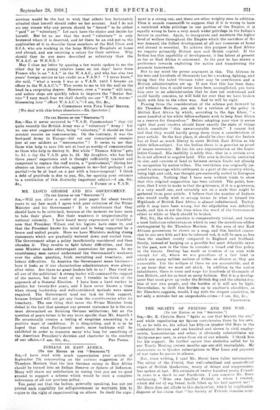INDIANS IN EAST AFRICA.
[To THE Emma or THE " SPECTATOR."' SLR,—I have read with much appreciation your article of September 7th commenting on the curious suggestion of Sir Theodore Morison that the late German colony in East Africa should be turned into an Indian Reserve or Sphere of Influence. Many will share my satisfaction in noting that you see no good ground to support a scheme which would be such a complete subversion of all our previous policy. •
You point out that the Indian, getitmally speaking, has not yet proved such capability for golf-government as warrants him to aspire to the right of experimenting on others. In itself the argu-
ment is a strong one, and there are other• weighty ones in addition. Thus it sounds reasonably to -suppose that if it is wrong to have a restricted white privilege in one portion of the Empire, it is equally wrong to have a very much wider privilege in the Indian's favour in another. Again, to inaugurate and maintain the higher level of welfare throughout the Empire which the sacrifices of the war demand, the fullest development of all our resources: at home and abroad is essential. To achieve this purpose in East Africa we require primarily British men and Britsh capital. If the Indian has this capability of development, it lies latent at present as far as East Africa is concerned. In the past he has shown a preference towards exploiting the native and transferring the proceeds homewards.
But to my mind the prime argument is this. The African in
his tens and hundreds of thousands has been working, fighting, and dying that the hated German ruler may be overthrown and a British administration set up. If now that this has been doge, and without him it could never have been accomplished, you turn him over to an administration that he does not understand and could hardly conceive, he will hold for ever that we have broken faith with him in the vilest way. And he will be right.
Passing from the consideration of the scheme put forward by
Sir Theodore Morison, you ask for a revision of the policy in British East Africa by which, according to the Aga Khan, " a mere handful of his white fellow-subjects wish to keep East Africa as a reserve for themselves." Before adopting your view it seems right that your readers should know exactly the state of things which constitute " this unwarrantable insult." I cannot but feel that they would hardly grasp them from a consideration of your article. In the first place, it should be clear that the Indian has at least as much liberty to enter British East Africa as his white fellow-subject. For the Indian there is in practice no proof of means necessary. He has his own representation on the Legis- lative Council. His inability is solely this: that in a certain area he is not allowed to acquire land. This area is distinctly restricted in size, and consists of land in between certain limits not already in occupation by native tribes. The restriction was originally im- posed to encourage white settlement in a part of the country which, being high and cold, was thought pre-eminently suited to European colonization. Nothing that I have seen written tends to show that this original supposition has been refuted. The point, how- ever, that I wish to make is that the grievance, if it is a grievance, is a very small one, and certainly not on a scale that might be gathered from your article. I believe that the number of Indians who would really wish to occupy farms in what is termed the Highlands of British East Africa is almost infinitesimal. Techni- cally it may have been wrong, but the stipulation was definitely made, and this is not the time when the word of the Government either to white or black should be broken.
But, Sir, the whole question is comparatively trivial, and forms a most ludicrous substratum on which to rear the monstrous edifice contemplated by Sir Theodore Morison. If the area of our East African possessions he shown on a map, and this limited conces- sion to our own kith and kin be coloured red, it will be seen as less than the smallest county compared to England and Scotland. Surely, instead of harping on a possible but most debatable error in the past, now is the time to consider a broad and free policy in the future. Destiny has made us trustees of an area wide enough for all, where we are guardians of a fair land in which are many million natives of tribes as diverse as they are numerable. For the welfare of these we are accountable, and it is an issue that we must not shirk. In addition to the native inhabitants, there is room and scope for hundreds of thousands of free British, and for as least as many Indians. But it is a develop- ment that must grow up under the British flag and the administra- tion of our own people, and the burden of it will not be light. Nevertheless, to shift this burden on to another's shoulders, as Sir Theodore suggests, would, I say with the deepest conviction, be not only a mistake but an unspeakable crime.—I am, Sir, &c., CRANWORTH.


























 Previous page
Previous page